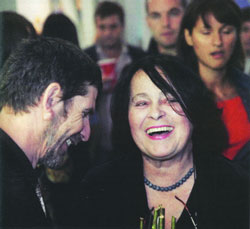Celluloid souvenirs and the best films of 2005
The year in cinema proved as wondrous as the events surrounding it were dark. If the clash of fundamentalisms, mounting avian influenza, and fast-forward global climate change weren’t troubling enough, dire prophecies of box-office ruin have been ritually sounded since the sluggish summer, as one Hollywood fiasco after another tanked upon release.
Final tallies will likely see the studios in profit, of course, with earnings from ancillaries and international markets. But the marked decline in movie attendance is as symptomatic of audiences’ displeasure at the dreck issuing from Hollywood—e.g., “The Dukes of Hazzard,” “Mr. and Mrs. Smith,” “Fantastic Four”—and the brutalization of today’s theater-going experience, as it is of consumer dispersal across proliferating wireless, on-demand, and other new delivery platforms.
Here in Nueva York, arthouse, museum, and nonprofit screens were continuously enlivened—from January’s choice Mexican cinema series at the Guggenheim, to late December’s openings of watershed new features by Euro-titans Claire Denis and Michael Haneke. In a year less crowded with genius, several other films would have joined my best of 2005 lists, compiled below. Some of the closest runners-up include “A History of Violence,” “Á Tout de Suite,” “Forty Shades of Blue,” and “The New World.”
In repertory programming, the Film Society of Lincoln Center hosted a remarkable stretch of retrospectives, from Kira Muratova in winter, to the Michael Powell centennial tribute in spring, to Louis Malle in summer, crowned by his “The Fire Within.” Sydney Pollack’s neo-noir “They Shoot Horses, Don’t They?” was deservedly lauded at the Tribeca Film Festival, and the most welcome theatrical revival was Antonioni’s sleek doppelgänger parable, “The Passenger.” Perhaps the single loveliest moment regained was Warhol’s scarcely seen “Blue Movie,” introduced by Viva at the New York Film Festival.
The repertory slate also brimmed with Asian cinema, with Maggie Cheung’s appearance at the Asian American International Film Festival like a pendant between, on the early side, Anthology’s Hou Hsiao-Hsien/Edward Yang salutes and the Museum of the Moving Image’s “Asian City Films” primer, and on the later side, the Mikio Naruse retrospective at Film Forum and MoMA’s weighty series of early Chinese and Japanese cinema.
The revelation of the year, however, was “Getting to Know the World” (1978), screened in the Walter Reade’s Kira Muratova retrospective and organized by Alla Verlotsky of the estimable Seagull Films. “Getting to Know the World” makes my best dozen films of 2005 because, virtually unseen here for the last quarter-century, its handful of screenings were effectively a New York debut, and because it did more than almost any other to enlarge my senses, comparable only to “The Intruder” for visionary astonishment.
From the unpromising Socialist Realist outline of a youthful romantic triangle set against the construction of a new Soviet factory-town by its future residents, Muratova conjures a carnivalesque improvisation between the plasterer Liuba, and two truck drivers—manic, abusive Nikolai, to whom she’s attached, and the soulful newcomer Misha. Muratova goes from an uproarious Komsomol group wedding, where Liuba reads a faltering toast from a pickup truck flatbed, to Misha and Liuba’s haute-hippie nuptials, everything festooned with shambolic whimsy and aglow with the voluptuous “ornamentalism” gleaned from her Ukranian forebear Sergei Paradjanov.
While counting the hours until the DVD release of “Getting to Know the World,” here are some of the year’s best DVDs—the selected short documentaries of Cuban supremo Santiago Álvarez, on Extreme Low Frequency; the seven-disc Unseen Cinema digest of early American avant-garde films; the Krzysztof Kiéslowski box from Kino, including his essential “Blind Chance;” Peter Watkins’ never-timelier “Punishment Park” on New Yorker; and the Val Lewton collection from Warner Brothers, with “I Walked With a Zombie” and the original “Cat People.” Cheers to Other Cinema DVD for making available Mike Kuchar’s underground milestone “Sins of the Fleshapoids,” the perfect follow-up to the Kuchar brothers restorations showcased last March at Anthology.
2005 yielded so many treasures that the customary ten won’t do. So here’s the dozen best, plus the top ten documentaries listed separately. My sole criterion was a single theatrical performance in New York in 2005, and even this was bent to include Stanley Kwan’s “Everlasting Regret,” which simply couldn’t keep until the next round. Of the rest, Ilya Khrzhanovsky’s “4,” will be released in New York on April 7 by Leisure Times Features, while Televisa Cine, the U.S. theatrical arm of Mexican media giant Grupo Televisa, is biding its time with Beto Gómez’s comic gem “Pink Punch,” yet to open stateside.
Best dozen films of 2005:
“4” directed by Ilya Khrzhanovsky
“Caché” directed by Michael Haneke
“The Death of Mr. Lazarescu” directed by Cristi Puiu
“Everlasting Regret” directed by Stanley Kwan
“Getting to Know the World” directed by Kira Muratova
“The Holy Girl” directed by Lucrecia Martel
“Instructions for a Light and Sound Machine” directed by Peter Tscherkassky
“The Intruder” directed by Claire Denis
“My Summer of Love” directed by Pawel Pawlikowski
“Pink Punch” directed by Beto Gómez
“Tropical Malady” directed by Apichatpong Weerasethakul
“The World” directed by Jia Zhangke
Top ten documentaries of 2005:
“The Birdpeople” directed by Michael Gitlin
“Detail” directed by Avi Mograbi
“Mouths of Ash” directed by Juan Manuel Echavarría
“Oh! Uomo” directed by Yervant Gianikian and Angela Ricci Lucchi
“States of UnBelonging” directed by Lynne Sachs
“To the Other Side” directed by Natalia Almada
“Troop 1500” directed by Ellen Spiro and Karen Bernstein
“Wetback: The Undocumented Documentary” directed by Arturo Perez Torres
“Why We Fight” directed by Eugene Jarecki
“William Eggleston in the Real World” directed by Michael Almereyda
In memory of producer Humbert Balsan (1954–2005), actor and activist Ossie Davis (1917–2005), screenwriter Gyula Hernádi (1926–2005), experimental filmmaker Mark LaPore (1952–2005), screenwriter Ernest Lehman (1915–2005), actress Brigitte Mira (1910–2005), director Pastor Vega (1940–2005), and actress Teresa Wright (1918–2005).
gaycitynews.com


































